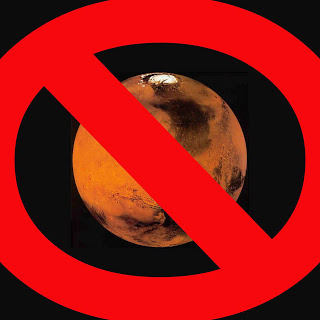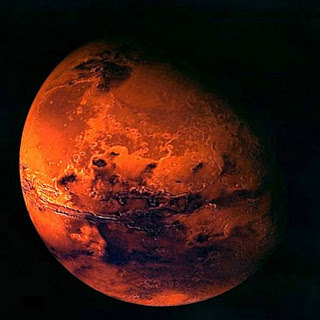Rod Pyle's Blog, page 2
April 7, 2012
End of an Empire

I remember it well... the day I realized that the Martian empire of Percival Lowell, Edgar Rice Burroughs and so many others vanished into the red sands of Mars. It was late July of 1965, I was a tender nine-years of age, and had spent countless hours devouring any and all books about Mars in our meager elementary school library. The jury was still out... was there life? Were there beings there? Was the "Wave of Darkening" really plant life waxing and waning with the seasons? Did the canals of late 19th Century fame exist?
Then from CalTech and JPL the results were made public. Mariner 4 had flown past the planet, snapping 22 images and revealing the truth. Mars was an arid desert: dry, desolate and cold beyond imagining. Via incredibly ingenious techniques, most unappreciated by this allegedly precocious lad, the scientists had seen Mars for what it really was... a dead world. It would be years before the dynamics of wind and water there would be observed; many more before they would be understood. The important thing was this: science had robbed me of a beloved (and adolescent) vision of our neighboring planet.
But there were holdouts. The popular press still circulated ideas that there might be life- even beings- holed up underground and beyond observation! Hope, though sputtering like a flame in a stiff breeze, remained.
But before long, other probes flew into the Great Darkness and journeyed past, then orbited, Mars; finally landing there in 1976. While the resulting data was intensely exciting to scientists and mature readers, to a young man, the news just got worse. Mars was dead.
Fortunately, this was the golden era of Apollo. Soon the adventures of a few select men who traveled to, then trod upon the lunar surface supplanted the news from the Red Planet. The moon was deader than Mars would ever be, but America had done it, and the laurels of accomplishment could never be taken form us. Humanity had visited another world. And surely, Mars would not be far behind.
As I grew into adolescence, I read the plans of North American Rockwell and others for follow-on missions to my favorite planet with breathless glee. Surely the amazing hardware of the Apollo program would be utilized for the Next Logical Step, to visit the next logical destination. No sane government would throw away such grand accomplishments. Mars was in our future.
Well, it still is. We all know what happened after Apollo wound down with the orbital link-up between an Apollo Command Module and a Soviet Soyuz spacecraft. That was it. The remaining boosters rusted outside NASA's space-age facilities in Florida, Houston and Huntsville. The Lunar Modules and other hardware remaining from the cancelled flights of Apollos 18, 19 and 20 were relegated to various museums.
So the question remains: who will go, and when. With China on an aggressive course toward a space station of their own, India and Japan angling for crewed spaceflight and other nations dreaming of joining the game, it is an open query.
But for now Mars remains the domain of robots, primarily of US origins, orbiting along silent paths above its arid plains and roving its dusty surface. We may yet find some form of life there; frozen water has been found in copious quantities and where there is water, life may well follow. It will not likely be bipedal or humanoid; if extant, it will likely be mere lowly bacteria. But if it is there, we wil find it, eventually. And if we find it, we will visit in person. Someday.
The dream lives on.
March 16, 2012
The End of Mars?

It looks as if the nemesis of so many Mars-bound probes, JPL's Great Galactic Ghoul (the mythical entity that is suspected of eating the failed Mars missions) may have the last laugh, courtesy of the White House. In February, the administration zeroed-out most Mars exploration funding.
So under this scenario, the Mars Science Lab would continue (little choice, as it launched some time ago), and MAVEN, an upcoming orbiter, would continue development. But all future endeavors, including NASA's participation in the European Space Agency's planned missions for 2016/2018. Besides a "failure of imagination" (to borrow words from the pain of Apollo 1), this represents a withdrawal from America's lead in space exploration, and especially our almost sole domination of Mars exploration. It is also a betrayal of the ESA and our planned mission cooperation.
At this point, NASA and JPL have a combined suite of spacecraft orbiting Mars which offer unprecedented cross-support of surface missions. Should MSL land and deploy successfully, it will enjoy an incredible network communication and mission support. This is a unique set of circumstances which are available nowhere other than Earth, and the clock is ticking: as the years pass, equipment ages, maneuvering fuel depletes and capabilities diminish. There is quite literally no time like the present to move forward.
Fortunately, there is pushback. In the last few weeks voices have been raised in Congress resisting the proposed cuts, which would amount to a fifth of planetary space exploration funding and associated programs. The new budget and its distribution will not be a slam-dunk. Other voices within governmental space-science circles have called the President's approach a "Going out of business scenario" for outer planets exploration, not to mention the inner solar system.
It is worth remembering that this comes after the cancellation of the Constellation moon/orbital program which, while possibly flawed in its planning, was arguably the only real governmental vision forward for human spaceflight at this time. Given the state of the Russian space program and launchers, some fear that a single launch failure could shut-down the space station, possibly permanently.
What will ultimately transpire remains to be seen. What is certain is that this is the time when our voices are critical. We all have other individual priorities, especially in a "down economy." It can be hard to maintain enthusiasm for planetary exploration when we are trying to keep our collective heads above water. But as I point out in "Destination Mars" again and again, few in modern space exploration have come close to the success that JPL has enjoyed over the decades. Their programs have a high rate of return, almost always many times the lab's expectations. And, even more intensely than NASA, the Lab has learned to do so much more with less. In fact, JPL and its associates receive an annual budget equivalent to about ten days of US Afghanistan war funding. From operating Mars Phoenix out of a university outbuilding to repurposing software and hardware from one mission to another, JPL has truly made lemonade out of lemons, to borrow a hackneyed phrase.
Please take a moment and lend your voice at this critical time. I don't like to ladle guilt onto readers (well, not much anyway)... but will make this exception: you can go here to contact your elected officials and express your support for the continued exploration of space. At a time when the United States finds itself challenged for excellence on every front, this is the one thing (besides building weapons and commercial software) that we continue to do better than anyone else. Let's continue.
March 2, 2012
Destination Mars

"Exploring Mars is a bit like doing brain surgery through a mile-long soda straw. At an average distance of fifty million miles from Earth, with a one-way radio message time of twelve to twenty minutes, roving the dry, treacherous surface requires the utmost in planning and careful execution. One false move can end a mission in seconds, and there are rarely many options to correct mistake. That is why the people who dare seek the truth about Mars are so remarkable. This is the story of human striving, from early times through tomorrow, to discover what makes Mars tick."
And so begins our exploration of Mars, the best prospect for crewed exploration in our solar system. Since 1964, NASA and the Jet Propulsion Laboratory have been sending robotic probes to the red planet to do just that. With uncanny accuracy and a magnificent record of success beyond our wildest expectations, these mechanical emissaries have pulled-back the many layers of mystery surrounding Mars. "Destination Mars" is a compeling telling of the many missions sent into the Great Darkness to our planetary neighbor; fact that reads like fiction. "A novelistic telling of a true story- a fantastic read." KK, LA Country Library.



